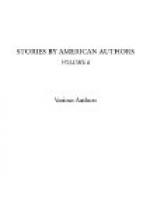“I will go to see him,” said the doctor to himself, as he went out upon the requisition of a grave man in a red tippet, who had just come for him. “He doesn’t look so very dangerous, and I think he can be tamed. I remember that his mother told me about him.”
Late that night, returning from his seven miles’ drive, as he left the causeway, built across a wide stretch of salt-marsh, crossed the rattling plank bridge and ascended the hill, he saw a light in the cottage window, where he had often been to attend Aunt Lois. “I will stop now,” said he. And, tying his horse to the front fence, he went toward the kitchen door. As he passed the window, he glanced in. A lamp was burning on the table. On a settle, lying upon his face, was stretched the convict, his arms beneath his head. The canvas bag lay on the floor beside him. “I will not disturb him now,” said the doctor.
A few days later Dr. Burt was driving in his sleigh with his wife along the Salt Hay Road. It was a clear, crisp winter forenoon. As they neared Eph’s house, he said:
“Mary, suppose I lay siege to the fort this morning. I see a curl of smoke rising from the little shop in the barn. He must be making himself a jimmy or a dark-lantern to break into our vegetable cellar with.”
“Well,” said she, “I think it would be a good plan; only, you know, you must be very, very careful not to hint, even in the faintest way, at his imprisonment. You mustn’t so much as suspect that he has ever been away from the place. People hardly dare to speak to him, for fear he will see some reference to his having been in prison, and get angry.”
“You shall see my sly tact,” said her husband, laughing. “I will be as innocent as a lamb. I will ask him why I have not seen him at the Sabbath-school this winter.”
“You may make fun,” said she, “but you will end by taking my advice, all the same. Now, do be careful what you say.”
“I will,” he replied. “I will compose my remarks carefully upon the back of an envelope and read them to him, so as to be absolutely sure. I will leave on his mind an impression that I have been in prison, and that he was the judge that tried me.”
He drove in at the open gate, hitched his horse in a warm corner by the kitchen door, and then stopped for a moment to enjoy the view. The situation of the little house, half a mile from any other, was beautiful in summer, but it was bleak enough in winter. In the small front dooryard stood three lofty, wind-blown poplars, all heading away from the sea, and between them you could look down the bay or across the salt-marshes, while in the opposite direction were to be seen the roofs and the glittering spires of the village.
“It is social for him here, to say the least,” said the doctor, as he turned and walked alone to the shop. He opened the door and went in. It was a long, low lean-to, such as farmers often furnish for domestic work, with a carpenter’s bench, a grind-stone, and a few simple tools. It was lighted by three square windows above the bench. An air-tight stove, projecting its funnel through a hole in one of the panes, gave out a cheerful crackling.




